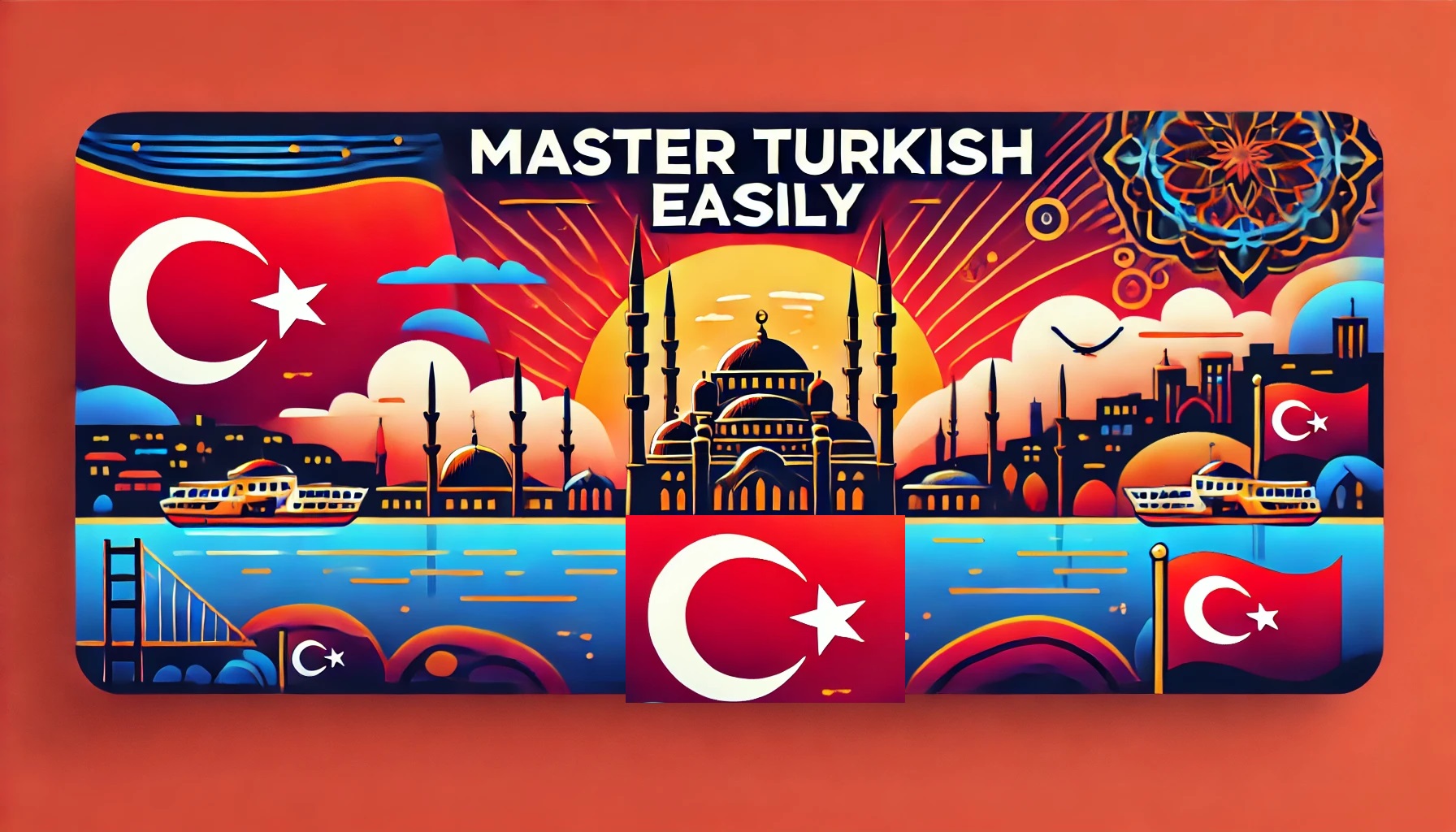Past Continuous Tense in Turkish

Past Continuous Tense in Turkish
B1 Grammar Lesson 61: Past Continuous Tense in Turkish (-iyordu)
🎯 What You’ll Master Today
🧠 Step-by-Step Construction Guide
| Step | Action | Example with “içmek” (to drink) | Rule |
|---|---|---|---|
| 1 | Find the verb root | iç- | Remove -mek/-mak |
| 2 | Add present continuous suffix | içiyor- | Follow vowel harmony: -iyor/-ıyor/-uyor/-üyor |
| 3 | Add past tense suffix | içiyordu | Add -du/-dı/-tu/-tı based on vowel harmony |
| 4 | Add personal suffix | içiyordum | Add -m/-n/-k/-niz/-ler for person |
| Verb (Infinitive) | Verb Root | Present Continuous | Past Continuous |
|---|---|---|---|
| yemek (to eat) | ye- | yiyor | yiyordu (was eating) |
| içmek (to drink) | iç- | içiyor | içiyordu (was drinking) |
| koşmak (to run) | koş- | koşuyor | koşuyordu (was running) |
| gitmek (to go) | git- | gidiyor | gidiyordu (was going) |
Turkish Quiz1

B. Personal Pronouns + Past Continuous
| Pronoun | Suffix | Example (içmek → içiyordu) |
|---|---|---|
| Ben | -m | İçiyordum (I was drinking) |
| Sen | -n | İçiyordun (You were drinking) |
| O | – (no suffix) | İçiyordu (He/She was drinking) |
| Biz | -k | İçiyorduk (We were drinking) |
| Siz | -nuz | İçiyordunuz (You were drinking – formal/plural) |
| Onlar | -lar | İçiyordular /içiyorlardı (They were drinking) |
Turkish Quiz2
🎭 Usage Examples in Context
🔸 Interrupted Actions – with “içmek”
| English | Turkish | Structure |
|---|---|---|
| I was drinking coffee when you called. | Sen aradığında kahve içiyordum. | Verb + -iyordum |
| She was drinking tea when I arrived. | Ben geldiğimde o çay içiyordu. | Verb + -iyordu |
| We were drinking water when the phone rang. | Telefon çaldığında su içiyorduk. | Verb + -iyorduk |
🔸 Parallel Actions
| English | Turkish | Time Marker |
|---|---|---|
| While I was drinking, my friend was eating. | Ben içiyordum, arkadaşım yiyordu. | No conjunction needed |
| They were drinking while we were talking. | Onlar içiyorlardı, biz konuşuyorduk. | Context shows simultaneity |
🔸 Specific Time in the Past
| English | Turkish | Time Expression |
|---|---|---|
| What were you drinking at 8 PM? | Akşam 8’de ne içiyordun? | Ne + verb + -iyordun |
| I was drinking orange juice this morning. | Bu sabah portakal suyu içiyordum. | Time + verb + -iyordum |
-
Comparison Table: Past Simple vs. Present Continuous vs. Past Continuous in Turkish
Tense Turkish Example English Translation Past Simple Dün sinemaya gittim. I went to the cinema yesterday. Present Continuous Şu anda film izliyorum. I am watching a movie now. Past Continuous Dün bu saatlerde film izliyordum. I was watching a movie at this time yesterday. Past Simple O, geçen hafta İstanbul’a uçtu. He flew to Istanbul last week. Present Continuous O şimdi uçakta oturuyor. He is sitting on the plane now. Past Continuous O, dün bu saatlerde uçuyordu. He was flying at this time yesterday. Past Simple Sabah kahvaltı yaptım. I had breakfast in the morning. Present Continuous Şu anda kahve içiyorum. I am drinking coffee now. Past Continuous Sen aradığında çay içiyordum. I was drinking tea when you called. Past Simple Çocukken futbol oynardım. I used to play football as a child. Present Continuous Şimdi tenis oynuyorum. I am playing tennis now. Past Continuous Dün parkta koşuyordum. I was running in the Click for interactive quiz and more example

Tense Comparison: Same Verbs in 3 Tenses
| Past Simple (Geçmiş Zaman) | Present Continuous (Şimdiki Zaman) | Past Continuous (-iyordu) |
|---|---|---|
| Dün kitap okudum. | Şu anda kitap okuyorum. | Dün bu saatlerde kitap okuyordum. |
| (I read a book yesterday.) | (I am reading a book now.) | (I was reading a book at this time yesterday.) |
| Geçen hafta İstanbul’a gittim. | Şimdi İstanbul’a gidiyorum. | O sırada İstanbul’a gidiyordum. |
| (I went to Istanbul last week.) | (I am going to Istanbul now.) | (I was going to Istanbul at that time.) |
| Sabah kahvaltı yaptım. | Şimdi kahvaltı yapıyorum. | Sen geldiğinde kahvaltı yapıyordum. |
| (I had breakfast in the morning.) | (I am having breakfast now.) | (I was having breakfast when you arrived.) |
| Dün akşam film izledim. | Şu anda film izliyorum. | Telefon çaldığında film izliyordum. |
| (I watched a movie last night.) | (I am watching a movie now.) | (I was watching a movie when the phone rang.) |
| Geçen yıl Türkçe öğrendim. | Şimdi Türkçe öğreniyorum. | Senle tanıştığımızda Türkçe öğreniyordum. |
| (I learned Turkish last year.) | (I am learning Turkish now.) | (I was learning Turkish when we met.) |
| Çocukken piyano çaldım. | Şu an piyano çalıyorum. | O gün piyano çalıyordum. |
| (I played the piano as a child.) | (I am playing the piano now.) | (I was playing the piano that day.) |
| Hafta sonu yürüyüşe çıktım. | Şimdi yürüyüşe çıkıyorum. | Yağmur başladığında yürüyüşe çıkıyordum. |
| (I went for a walk on the weekend.) | (I am going for a walk now.) | (I was going for a walk when it started raining.) |
| Dün maçı kazandık. | Şu an maçı kazanıyoruz. | Hakem düdük çaldığında kazanıyorduk. |
| (We won the match yesterday.) | (We are winning the match now.) | (We were winning when the referee blew the whistle.) |
| Geçen ay yeni bir araba aldım. | Şimdi yeni bir araba alıyorum. | Kaza olduğunda araba alıyordum. |
| (I bought a new car last month.) | (I am buying a new car now.) | (I was buying a car when the accident happened.) |
| Çocukken resim yaptım. | Şu anda resim yapıyorum. | Öğretmen girdiğinde resim yapıyordum. |
| (I drew pictures as a child.) | (I am drawing a picture now.) | (I was drawing when the teacher entered.) |
Key Takeaways:
-
Past Simple: Completed actions in the past (
-dı/-di). -
Present Continuous: Actions happening now (
-iyor). -
Past Continuous: Ongoing past actions (often interrupted,
-iyordu).
What Students Will Learn from These Tables
1. How Turkish Verbs Change Across Tenses
-
Past Simple (-dı/-di): Recognizes completed past actions.
-
Example: “Gittim” (I went) → Understands this is a finished action.
-
-
Present Continuous (-iyor): Identifies ongoing actions now.
-
Example: “Gidiyorum” (I am going) → Learns to describe current actions.
-
-
Past Continuous (-iyordu): Recognizes past actions in progress (often interrupted).
-
Example: “Gidiyordum” (I was going) → Understands unfinished past actions.
-
2. Turkish Sentence Structure
-
Sees how subject + verb + tense suffix works in Turkish (no auxiliary verbs like “am/is/are”).
-
Example: “Ben kitap okuyorum” (I am reading a book) → Learns word order and suffix-based grammar.
-
3. Time Markers in Context
-
Associates time words with tenses:
-
Past Simple: “Dün” (yesterday), “geçen hafta” (last week).
-
Present Continuous: “Şu anda” (now), “şimdi” (currently).
-
Past Continuous: “O sırada” (at that time), “sen gelirken” (when you came).
-